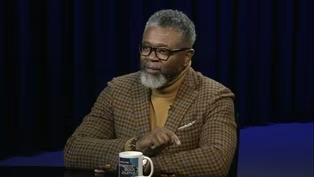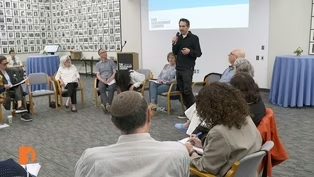
Irene Miller, a Holocaust survivor’s story
Clip: Season 10 Episode 21 | 7m 5sVideo has Closed Captions
Irene Miller speaks to One Detroit contributor Sarah Zientarski about survival, loss and strength.
One Detroit is sharing the stories of Holocaust survivors who settled in Michigan as part of our ongoing “Destination Detroit” series. There were about 4,000 survivors who came to the state after World War II. Irene Miller is among the survivors who rebuilt her life in Michigan. She spoke to One Detroit contributor Sarah Zientarski about survival, loss and strength during and after the Holocaust.
Problems playing video? | Closed Captioning Feedback
Problems playing video? | Closed Captioning Feedback
One Detroit is a local public television program presented by Detroit PBS

Irene Miller, a Holocaust survivor’s story
Clip: Season 10 Episode 21 | 7m 5sVideo has Closed Captions
One Detroit is sharing the stories of Holocaust survivors who settled in Michigan as part of our ongoing “Destination Detroit” series. There were about 4,000 survivors who came to the state after World War II. Irene Miller is among the survivors who rebuilt her life in Michigan. She spoke to One Detroit contributor Sarah Zientarski about survival, loss and strength during and after the Holocaust.
Problems playing video? | Closed Captioning Feedback
How to Watch One Detroit
One Detroit is available to stream on pbs.org and the free PBS App, available on iPhone, Apple TV, Android TV, Android smartphones, Amazon Fire TV, Amazon Fire Tablet, Roku, Samsung Smart TV, and Vizio.
Providing Support for PBS.org
Learn Moreabout PBS online sponsorship(inspiring music) (uplifting music) - Not only am I fortunate that I survive, but I am more fortunate that I was able to create a very meaningful life and significantly contribute to my community.
Why did I start talking?
I tell them- In my case, it was my personal tragedy.
The death of my daughter Naomi.
She always asked me to tell her my story and I never wanted to do it.
- [Narrator] Now, Irene Miller shares what she endured during the Holocaust through public talks and in her memoir.
- Writing the book was an emotional journey that I needed.
I wrote the book as me telling the story to Naomi that I didn't tell in her lifetime.
Speaking throughout the United States is a mission for me to let the world know what hate and prejudice did, and what hate and prejudice can do again, unless we learn from it.
My extended family was close to 100 members.
Not a single one of them survived.
When I speak, I'm their voice as well.
- [Narrator] Miller is among the thousands of Holocaust survivors who have made Michigan home.
- I came to live permanently in Michigan, 1970, but I have lived for brief periods of time too.
I married in Israel when I just turned 18 to a man from Detroit.
And originally, this is what brought us to Detroit.
- Here is Katie Chaka Parks, Director of Education at the Zekelman Holocaust Center.
She reflects on the lasting impact Holocaust survivors have had on Michigan's communities.
- After the war, about 100,000 Holocaust survivors come to the United States, and about 4,000 of them settle here in Michigan.
So they're actually the ones that are responsible for creating this entire museum.
They really wanted to be able to memorialize their loved ones that were murdered, and all the experiences that they had had.
Before the war, I mean, Michigan had a very thriving Jewish community.
We always have.
We were very integral even during the Holocaust, trying to send aid and help to those in Europe.
And so for many people, they knew that coming to Michigan, they would have help when they came here afterwards.
- The Zekelman Holocaust Center keeps survivor voices alive through public talks by survivors themselves, second generation speakers, and educational programs that pass their stories on to future generations.
Irene Miller is one of those survivors who speaks at the center to share her story.
- When I tell my story, I convey the emotions that comes with it.
We started hearing that Soviet soldier were coming in the middle of the night taking away all the young men.
So my mother took the train to the city where dad worked to warn him not to come back until he hears from her, but she missed the last train coming back to us.
And that night, when my sister and I were alone, Soviet soldier kicked in the door of the cabins.
They gave us a few minutes to scoop up whatever we could, and they marched just to a train station, where there was a long line of kettle cars, and they would shove in as many people as they could in each of those box cars.
This was meant for transportation of cows, horses, and so on.
No light, no windows.
Once a day, they will let everyone under the train to relieve themselves.
Everyone goes simultaneously.
Doesn't take long, you forget about the notion of privacy.
Our food was most of the time a cup of soup for the day.
That was it.
We were on that train.
Somewhere between six and eight weeks with the doors closed.
They delivered us to a labor camp in the Siberian Taiga.
Bears would come to the door front.
At night, we heard Siberians wolf howling.
If you were outside, any part of your skin exposed wouldn't take more than a few minutes, it would get frostbitten.
We didn't have clothing for that kind of a climate.
In Uzbekistan, we almost starved to death.
My mother would go into the field, pick up anything that was grown wildly, boil it, drink it first herself to see how it affected.
If she was okay, she would give it to us as well.
I never thought of a diet, never.
And you know, if anything, it's difficult for me to say what powers we are born with of, you know, what contributes to survival as opposed to not.
But there one thing that I feel helped me, not just in the Holocaust, but in difficulties and traumatic difficulties in lives that are had after the Holocaust.
In the most difficult situations, find one grain of positivity, water it, nurture it, and clink to it.
There is not a situation, no matter how painful it is, that you cannot find one little grain of something.
Only 10% of Jewish children survived.
Almost all of them gone by now, but those of us who survived become the voices of those who didn't live to tell their story.
- [Narrator] Chaka Parks explains sharing survivor stories isn't just about preserving history, It's about helping people understand the real human costs of hate, and why remembrance is essential to preventing it from ever happening again.
- We always say that when you hear a survivor's testimony, you become witness to that testimony as well.
When you hear next generation speakers and survivors talk, you take those stories and you pay it forward by telling someone about your experience and what you learned.
Because it's that educational component that I think is so important that makes us a better community, a better place to live, that we all understand the humanity in one another.
Commemorating the 100th anniversary of the civil rights case involving Dr. Ossian Sweet in Detroit
Video has Closed Captions
Clip: S10 Ep21 | 4m 6s | The legacy of Dr. Ossian Sweet, 100 years after he defied segregation and defended his property. (4m 6s)
Descendants of Holocaust survivors preserve their families’ stories
Video has Closed Captions
Clip: S10 Ep21 | 11m 29s | One Detroit looks at how the children of Holocaust survivors are carrying on their parents’ legacies (11m 29s)
Providing Support for PBS.org
Learn Moreabout PBS online sponsorship
- News and Public Affairs

Top journalists deliver compelling original analysis of the hour's headlines.

- News and Public Affairs

FRONTLINE is investigative journalism that questions, explains and changes our world.












Support for PBS provided by:
One Detroit is a local public television program presented by Detroit PBS

